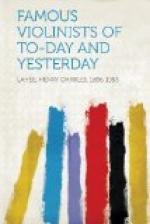Although Paganini denied ever having taken lessons with Rolla, he nevertheless had frequent discussions with him concerning the new effects which he was continually attempting, and which did not always meet with the unqualified approval of the older musician.
The music which he wrote for his instrument contained so many difficulties that he had to practise unremittingly to overcome them, often working ten or twelve hours a day and being overwhelmed with exhaustion.
In 1797 Paganini made his first tour, with his father, through the chief towns of Lombardy, and now he determined to release himself, on the first opportunity, from the bondage in which he was held by his father. This opportunity presented itself when the fete of St. Martin was celebrated at Lucca, and after much opposition he at last obtained the consent of his father to attend the celebration. Meeting with much success, he went on to Pisa, and then to other places, in all of which he was well received. Being now free from the restraint of his home he fell into bad company, and took to gambling and other vices, the most natural result of his father’s harsh training showing itself in lack of moral stamina.
For a time his careless life had its allurements, but the young virtuoso was frequently reduced to great straits, and on one occasion, if not more, pawned his violin. This happened at Leghorn, where he was to play at a concert, and it was only through the kindness of a French merchant, M. Livron, who lent him a beautiful Guarnieri, that he was able to appear. When the concert was over, and Paganini brought back the instrument, its owner was so delighted with what he had heard that he refused to receive it. “Never will I profane strings which your fingers have touched,” he said, “the instrument is now yours.” And Paganini used that violin afterwards in all his concerts.
This violin was, some time later, the means by which he was cured of gambling, for having been reduced to extreme poverty, he was tempted to sell it. The price offered was a large one. At this juncture he won one hundred and sixty francs, which saved the violin, but the mental agony he endured through the affair convinced him that a gamester is an object of contempt to all well regulated minds.




